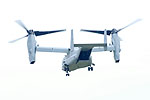Belize offers premier training opportunities to Marines
 BRITISH ARMY TRAINING SUPPORT UNIT, BELIZE – (Sept. 16, 2011) — Belize is a premier training ground for many NATO allies. Military units from Britain, Poland, Norway, Spain and others have all taken advantage of the unique training experiences the Central American country can provide. Recently, Marine Medium Tiltrotor Squadron 365 from MCAS New River and Marine Wing Support Squadron 271 self-deployed four MV-22B Ospreys to Belize to evaluate the merit of future Marine Corps exercises in the region.
BRITISH ARMY TRAINING SUPPORT UNIT, BELIZE – (Sept. 16, 2011) — Belize is a premier training ground for many NATO allies. Military units from Britain, Poland, Norway, Spain and others have all taken advantage of the unique training experiences the Central American country can provide. Recently, Marine Medium Tiltrotor Squadron 365 from MCAS New River and Marine Wing Support Squadron 271 self-deployed four MV-22B Ospreys to Belize to evaluate the merit of future Marine Corps exercises in the region.
The Marine Corps gears itself for desert warfare after becoming been engaged in Afghanistan since 2001 and Iraq since 2003. However, the Corps is an expeditionary force that must be prepared to fight in any clime and place. Belize offers a way to maintain an edge in environment beyond the desert. Belize is a member of the United Kingdom's Commonwealth Realms. Britain realized the training value of Belize's diverse terrain and built training facilities there. British Army Training Support Unit Belize was formed to support units deploying from the U. K. to Belize for three to six weeks of jungle warfare courses and light infantry training.
"The training regimen is based on a mixture of jungle and open terrain," said British Army Lt. Col. Robert Lindsay, commanding officer of BATSUB. "A typical exercise here will include time in the jungle practicing basic survival skills, navigation and all sorts of other things that are much more demanding here than in other places.”
For both air and ground Marines, the terrain in Belize offers challenges not normally seen in Iraq or Afghanistan. Operating in the jungle requires different knowledge and skills than the desert, and training in Belize gives Marines the chance to learn those skills in case they are deployed to such an environment.
“We have prepared for and trained to the limitations of the aircraft in desert environments because that has been our focus of effort since the Osprey first deployed to combat in 2007,” said Lt. Col. Craig LeFlore, commanding officer of VMM-365 and the 2nd Marine Aircraft Wing detachment. “We need to expand into some different environments now. Coming here to Belize, we’re given the opportunity to work in an environment that sees frequent tropical rainstorms, and therefore is much more humid, providing different challenges for our avionics-intensive aircraft.”
Osprey maintainers need to know how to troubleshoot, fix and operate in this environment in order to make sure the aircraft are ready for any mission that’s assigned, said LeFlore. For the pilots and aircrew, conducting operations to austere landing sites located in mountainous jungle terrain while dealing with unpredictable weather is good training.
Belize also offers large scale exercise capabilities, said Lindsay. The inner portions of the country are sparsely populated, allowing visiting units the ability to conduct company and battalion-sized maneuvers. The units can practice patrolling, reconnaissance patrols, ambushes and more. These exercises pit Marines against each other, providing a more dynamic learning environment than Marines pitted against targets.
Belize not only has the facilities to support foreign training exercises, it also has the willingness to host the evolutions. Marine exercises can bring benefits to the country for both the government and local landowners, prompting residents to welcome instead of oppose the presence of foreign troops. Lindsay said that training exercises act as a deterrent against poachers, illegal loggers, smugglers and other illegal land use.
The country also harbors positive attitudes toward the U.S. and speaks English, which are two additional advantages, Lindsay explained. “Because Belize is a stable country in America’s backyard with a number of excellent training opportunities, I think a number of people from the U.S. perspective would see the benefits of coming here,” said Lindsay. “From my point of view we would be delighted to see U.S. Marines train here.”